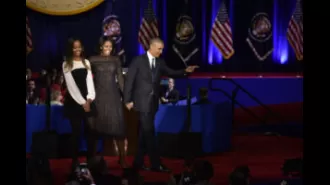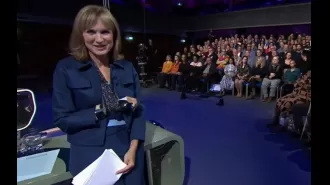A police officer who used a taser on a 95-year-old man claims it was necessary as the man posed an immediate threat.
Officer defends use of taser on elderly woman with knife, says it was necessary to address the danger.
November 18th 2024.

During a trial, a police officer, Senior Constable Kristian White, explained from the witness box that he had used his stun gun on an elderly woman, Clare Nowland, who was holding a steak knife and exhibiting symptoms of dementia. The incident occurred in a treatment room at Yallambee Lodge aged-care home in Cooma, New South Wales in the early hours of May 17, 2023. Unfortunately, the 95-year-old great-grandmother fell and hit her head, eventually passing away in the hospital a week later.
White, who was 34 years old at the time, stated that his intention was not to cause harm, but rather to incapacitate and disarm the resident. He expressed his regret and sadness over the outcome, emphasizing that he never intended for her to be injured. He had given her multiple verbal warnings and had even activated the warning arc on the stun gun, but Nowland continued to move forward, ignoring his attempts to reason with her.
Under questioning from his defence barrister, Troy Edwards SC, White explained that he eventually made the decision to use the stun gun because the situation was escalating and he feared for the safety of everyone present. He denied suggestions from the crown prosecutor, Brett Hatfield SC, that Nowland was stationary and posed no immediate threat. White stated that he had only observed her for a minute and could not make assumptions about her speed or intentions.
White also addressed the issue of the exceptional criteria test required by police for the use of a stun gun on an elderly person. He admitted that he was not aware of this test until after the incident when his partner, then-acting Sergeant Jessica Pank, showed him the standard police operating procedures. However, he believed that the tasering was justified as it met the criteria and was necessary to maintain the peace.
When asked about the possibility of Nowland falling and getting injured due to her age and frailty, White stated that he did not believe this was a significant risk. He described her as "not the frailest" person he had encountered and believed that letting her wander the facility armed with a knife would have put more people at risk. As a police officer, his duty was to maintain the peace, and he believed that allowing Nowland to continue with a weapon would have been a breach of that duty.
The officer pleaded not guilty to manslaughter, as he was accused of criminal negligence or conducting an unlawful and dangerous act that led to the unlawful killing of Nowland. He maintained his stance that he had acted in accordance with his training and the exceptional criteria test. White admitted that the incident was a difficult and regrettable event, and he hoped for a fair and just outcome in the trial.
White's testimony shed light on the events that occurred that night and provided insight into the split-second decision he had to make. The trial continued into its second week, and the jury was left to consider the evidence presented to them. In the end, they would have to decide whether White's actions were justifiable or if he was guilty of a crime. Until then, the truth behind the tragic incident remained a matter of debate and interpretation.
White, who was 34 years old at the time, stated that his intention was not to cause harm, but rather to incapacitate and disarm the resident. He expressed his regret and sadness over the outcome, emphasizing that he never intended for her to be injured. He had given her multiple verbal warnings and had even activated the warning arc on the stun gun, but Nowland continued to move forward, ignoring his attempts to reason with her.
Under questioning from his defence barrister, Troy Edwards SC, White explained that he eventually made the decision to use the stun gun because the situation was escalating and he feared for the safety of everyone present. He denied suggestions from the crown prosecutor, Brett Hatfield SC, that Nowland was stationary and posed no immediate threat. White stated that he had only observed her for a minute and could not make assumptions about her speed or intentions.
White also addressed the issue of the exceptional criteria test required by police for the use of a stun gun on an elderly person. He admitted that he was not aware of this test until after the incident when his partner, then-acting Sergeant Jessica Pank, showed him the standard police operating procedures. However, he believed that the tasering was justified as it met the criteria and was necessary to maintain the peace.
When asked about the possibility of Nowland falling and getting injured due to her age and frailty, White stated that he did not believe this was a significant risk. He described her as "not the frailest" person he had encountered and believed that letting her wander the facility armed with a knife would have put more people at risk. As a police officer, his duty was to maintain the peace, and he believed that allowing Nowland to continue with a weapon would have been a breach of that duty.
The officer pleaded not guilty to manslaughter, as he was accused of criminal negligence or conducting an unlawful and dangerous act that led to the unlawful killing of Nowland. He maintained his stance that he had acted in accordance with his training and the exceptional criteria test. White admitted that the incident was a difficult and regrettable event, and he hoped for a fair and just outcome in the trial.
White's testimony shed light on the events that occurred that night and provided insight into the split-second decision he had to make. The trial continued into its second week, and the jury was left to consider the evidence presented to them. In the end, they would have to decide whether White's actions were justifiable or if he was guilty of a crime. Until then, the truth behind the tragic incident remained a matter of debate and interpretation.
[This article has been trending online recently and has been generated with AI. Your feed is customized.]
[Generative AI is experimental.]
0
0
Submit Comment





